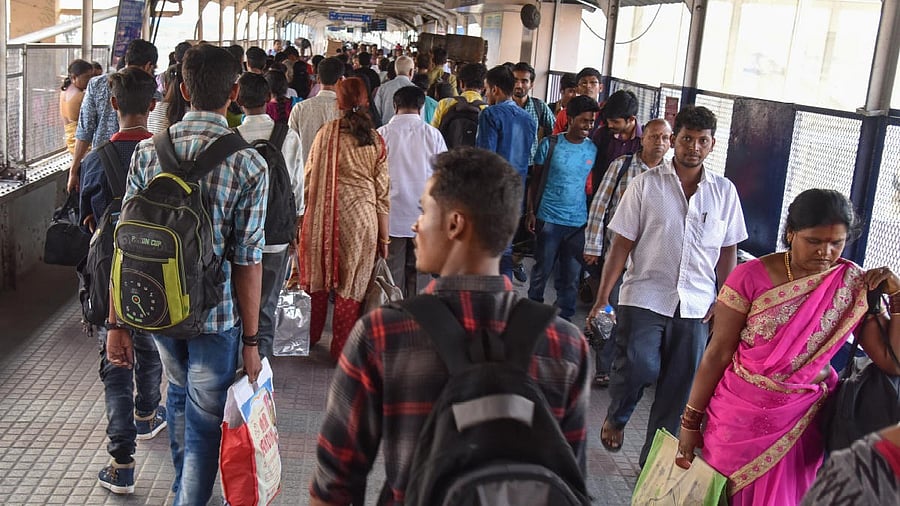
The state says there is a need to invest in those cities that are providing employment to people from less-developed states.
Credit: DH File Photo
The Karnataka government wants that its economic development and urbanisation should be taken into account while deciding the state’s share of central tax revenues and various grants, given the fact that it receives a lot of workforce from relatively less-developed states, and the income that economic migrants earn here also helps their home states.
This, and other suggestions, form part of a communication that the state has sent to the Union Finance Ministry. The latter has begun work on setting up the Sixteenth Finance Commission (16th FC) and has sought inputs from states in deciding the Terms of Reference of the constitutional body.
The 16th FC will decide the devolution of the Centre’s divisible tax pool and other grants and financial awards to the states for fiscal years 2026-27 to 2030-31.
In its letter, Karnataka has said that since the impact of some metropolitan areas to the per capita income of certain states is significant, the 16th FC should consider excluding cities like Bengaluru, Hyderabad, Kolkata, etc, so as to arrive at a more accurate per capita income level for the respective states.
“The impact of a few metropolitan cities on the per capita income of the state is significant, as this results in very high per capita income for the state as a whole, though major parts of the state remain less developed with significantly lower per capita income,” the letter states.
“We have also asked that the central government’s cesses and surcharges be included as part of the divisible tax pool,” said a top official aware of the development. The 15th FC, for the period 2020-21 to 2025-26, had mandated that 41% of the Centre’s tax kitty be divided among states, though this does not include cess and surcharges.
The communication comes against the backdrop of the Congress, which won the state by a landslide, attacking the BJP for the “injustice” in devolution. The state’s share in the divisible pool of taxes was reduced to 3.65% under the 15th FC when compared with 4.71% fixed by the 14th FC. Because of this, Karnataka has incurred a shortfall in tax devolution to the tune of Rs 26,140 crore over the last three years, according to Chief Minister Siddaramaiah.
Due to increased mobility of labour and vastly improved transportation facilities, higher growth in developed states would have positive spillover of benefits to poorer states through higher employment, higher demand for raw materials, etc, it says.
“Important metropolitan centres attract labour from all over the country. There is a need to invest in those cities that are providing employment to job seekers from less developed states,” the letter says.
The suggestions given by Karnataka form part of a larger political narrative where many feel that southern and western states are subsidising poorer northern and eastern states. When the 15th FC was framing its recommendations to the central government, the southern states had written to the then finance minister Arun Jaitley asking that they be rewarded for the work they have done in economic development, employment, health, education, population control, life expectancy, etc.
The Centre had also tasked the 15th FC with suggesting awards based on whether states are indulging in ‘populist schemes’ or ‘freebies’. In the end, the 15th FC could not come up with a definition of what constitutes such schemes. “We have asked that the Centre stay away from this whole debate, as welfare schemes are the prerogative of the elected state governments,” the official quoted above said.
“Essentially there should be no conditionality attached to various grants and awards due to the states, be it the so-called populist schemes or how well the states implement a central scheme, as anyways states have lost taxation autonomy due to GST,” the official said.
Karnataka has also asked that the more developed states should have lesser limits on how much they borrow from the bond markets, as they have greater infrastructure investment needs and have a better ability to repay the debt. Currently, the Finance Ministry allows states to borrow 3.5-4% of their respective GSDP, based on various conditions.
